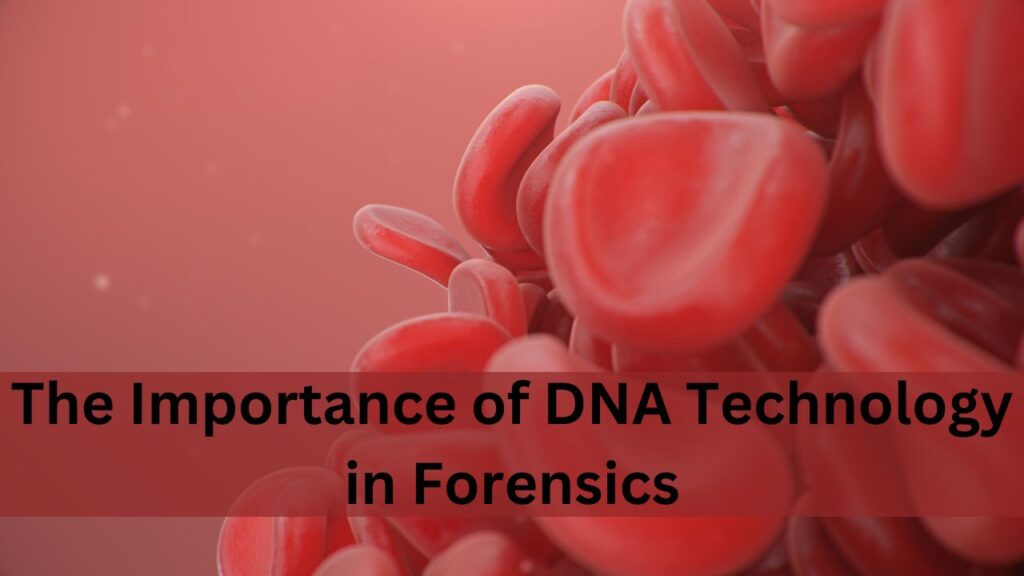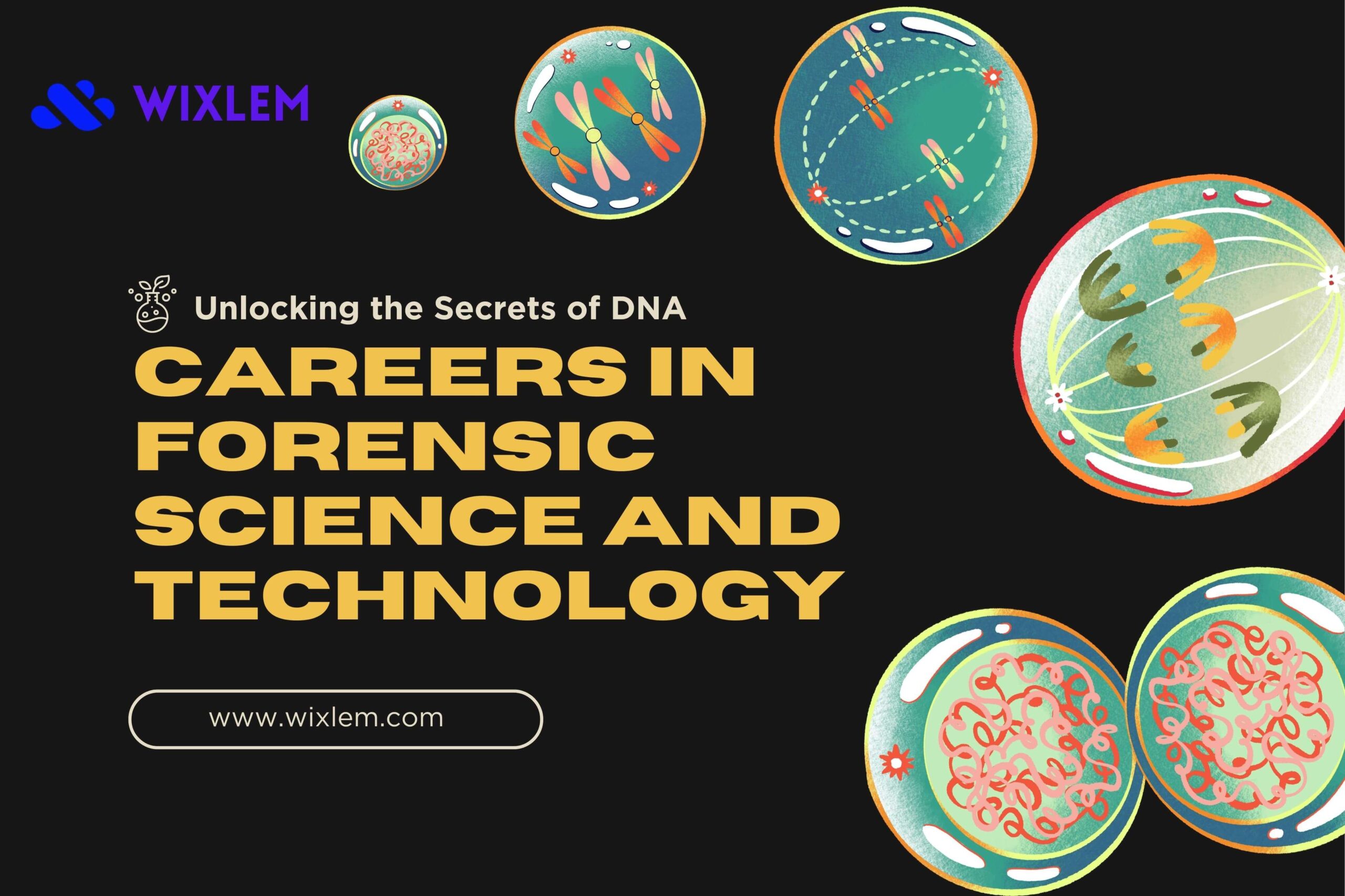As technology advances, forensics includes DNA analysis in criminal investigations. Careers in Forensic Science and Technology DNA technology has revolutionized forensic investigations and led to new careers that combine both fields. In this article, I will provide an overview of DNA technology and forensics careers, the educational requirements and skills needed for success, job opportunities, and advancements in DNA technology and its impact on forensic investigations.
Introduction to DNA Technology and Forensics
DNA technology is the use of molecular biology techniques to analyze DNA samples.Careers in Forensic Science and Technology Careers in Forensic Science and Technology Forensics, on the other hand,Careers in Forensic Science and Technologyis the scientific analysis of physical evidence in criminal investigations. DNA technology has become an essential tool in forensic investigations, leading to several careers combining both fields.
Overview of Careers in DNA Technology and Forensics
Careers that combine DNA technology and forensics. These include DNA analysts, forensic DNA specialists, and forensic technicians. Careers in Forensic Science and Technology Each of these careers requires a unique set of skills and educational requirements.
What is forensics?
Investigating crimes and legal disputes using scientific tools and procedures is called forensics. Careers in Forensic Science and Technology Physical evidence, including DNA samples, fingerprints, fibres, and bloodstains, is gathered, analyzed, and interpreted. Forensic science is critical to the justice system by giving law enforcement, courts, and other stakeholders objective, trustworthy information.
DNA Analyst
DNA analysts are highly skilled individuals focused on examining DNA evidence in criminal investigations.Careers in Forensic Science and Technology They are tasked with gathering, processing, and analyzing DNA samples for forensic labs to shed light on criminal investigations. They locate suspects and solve crimes.
What is DNA technology?
DNA technology is a broad term that describes molecular biology methods to modify and analyze DNA.Careers in Forensic Science and Technology It includes a variety of techniques and equipment used to examine gene expression, find genetic variants, and investigate DNA sequences. Forensic science uses DNA technology to collect and examine evidence. DNA samples from crime scenes, victims, and suspects. By using this technology, criminal justice. Professionals can connect people, locate potential suspects, and compile evidence for court use. DNA technology has transformed forensic science, and greatly increased the precision and reliability of criminal investigations.
The Importance of DNA Technology in Forensics

DNA technology has revolutionized forensic science by delivering accurate and dependable results in criminal investigations. Careers in Forensic Science and Technology DNA evidence has solved crimes, identified suspects, and cleared innocent people. It has also sparked the creation of novel forensic methods like DNA genealogy and family DNA analysis. These methods have helped law enforcement solve unsolved cold cases.
DNA Analysts’ Role in Forensic Investigations
DNA experts are indispensable in forensic investigations. They gather, process, and analyze DNA evidence to investigate crimes and identify suspects. Careers in Forensic Science and Technology DNA analyzers must be extremely proficient in various molecular biology procedures and function well under time constraints. Additionally, they must deliver precise and trustworthy results that can be utilized in court.
Educational Requirements for a Career in DNA Technology and Forensics
DNA experts are indispensable in forensic investigations. They gather, process, and analyze DNA evidence to investigate crimes and identify suspects. DNA analyzers must be extremely proficient in various molecular biology procedures and function well under time constraints. Additionally, they must deliver precise and trustworthy results that can be utilized in court.
Skills Needed for a Successful Career in DNA Technology and Forensics
Special abilities are necessary for a successful DNA technology and forensics career. Strong analytical and problem-solving abilities, attention to detail, and the capacity to function well in a team are requirements. Additionally, those working in these fields need to be able to explain complicated scientific concepts to non-scientific audiences like judges and juries. Additionally, they must be able to collaborate with a wide range of parties, such as prosecutors, lawyers, and forensic scientists.
Job Opportunities in DNA Technology and Forensics
DNA technology and forensics offer many job opportunities. Careers in Forensic Science and Technology These include DNA analysts, forensic DNA specialists, and forensic technicians. Private crime consulting firms, crime laboratories, and law enforcement agencies may offer jobs.
Job Outlook and Salary Expectations for DNA Technology and Forensics Careers
DNA technology and forensics careers have strong job prospects. Salaries for these careers vary depending on experience, education, and location. Individuals in these careers can expect a competitive salary.
Advancements in DNA Technology and its Impact on Forensic Investigations
Advancements in DNA technology have significant impacts on forensic investigations.Careers in Forensic Science and Technology Various techniques, such as familial DNA searching and forensic genealogy, have led to the resolution of cold cases and the identification of previously unknown suspects. In addition, advances in DNA sequencing technology have led to new tools for analyzing DNA evidence.
The intersection of DNA Technology and Forensics
DNA technology and forensics have led to new careers combining both fields. Forensic DNA specialists specialize in DNA technology for criminal investigations. These individuals may work with law enforcement agencies, crime laboratories, or private forensic consulting firms.
Forensic DNA Specialist
A forensic DNA specialist is a professional who specializes in DNA technology for legal investigations. Forensic DNA specialists collect, process, and analyze DNA evidence and provide expert testimony in court. These individuals must have a strong understanding of molecular biology techniques and the ability to communicate complex scientific information to non-scientific audiences.
Why are DNA Technology and Forensics Working Together?
Criminal investigations have changed thanks to DNA technology and forensics integration. Careers in Forensic Science and TechnologyCareers in Forensic Science and Technology DNA evidence has become a vital weapon in the fight to clear innocent people of wrongdoing, solve crimes, and identify criminals.
Required Education and Skills for a Career in DNA Technology and Forensics
Bachelor’s degrees are typically required for forensic science and DNA technology jobs. Strong educational foundation, superior analytical and problem-solving skills. Working well in a team is essential. Additionally, Careers in Forensic Science and Technologypeople must stay current with forensic science and DNA technology developments.
How to Prepare for a Career in DNA Technology and Forensics
You can prepare for forensics and DNA technologies. These consist of earning a degree in a relevant profession, acquiring job experience through internships or voluntary work, and looking at further education or certification courses. Communication and interpersonal skills are crucial, as well as a solid legal understanding.
Career Options Combining DNA Technology and Forensics
Many job alternatives exist for those interested in merging DNA technology and forensics. Careers in Forensic Science and TechnologyThese professionals include forensic technicians, DNA analyzers, and DNA experts. Each profession involves using DNA technology to solve crimes and bring justice to victims, though skills and training requirements vary.
Forensic Technician
A forensic technician supports criminal scientists and other professionals during criminal investigations.Careers in Forensic Science and Technology Maintaining the integrity of crime scenes, gathering evidence, processing it, and writing reports for use in court may all fall under crime scene specialists. They must have a thorough knowledge of forensic science and DNA technologies and superior organizational and attention-to-detail skills.
The Following Post You Like:
Top Innovative Cloud Computing Solutions in 2023
Powerline Networking Pros and Cons: Making an Informed Decision
Careers in Forensic Sciences
Conclusion
The combination of DNA technology and forensics has led to the development of new careers that are essential in the fight against crime. Individuals interested in pursuing a career in DNA technology and forensics should obtain a degree in a related field. They should also gain experience through internships or volunteer work, and stay up-to-date with DNA technology and forensic science advances.
FAQs
What is DNA technology?
DNA technology is the use of molecular biology techniques to analyze DNA samples.
What is forensics?
Forensics is the scientific analysis of physical evidence in criminal investigations.
What is the role of DNA analysts in forensic investigations?
DNA analysts collect, process, and analyze DNA evidence in criminal investigations.
What education is required for a career in DNA technology and forensics?
It is usually required to hold a bachelor’s degree in a related field, such as science, chemistry, or measurable science. It works in DNA technology and forensic science.



